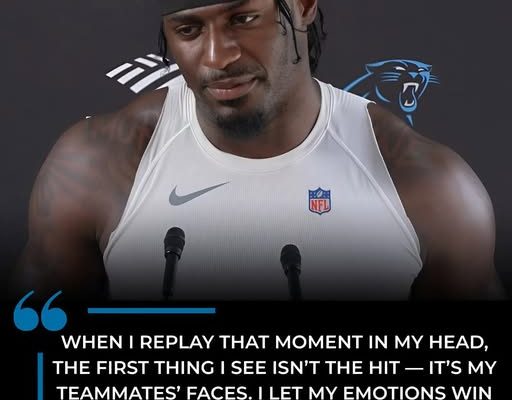The NFL has seen its share of emotional outbursts, sideline confrontations, and headline-grabbing altercations, but what unfolded with Xavier Legette this week will go down as one of those moments that instantly etches itself into the memory of fans, players, and analysts alike. The incident, which has now been humorously dubbed “Helmet Airlines” across social media, stemmed from a single heated play and has since exploded into a viral talking point, overshadowing the game itself. For Legette, a rising NFL wide receiver with a reputation for his physicality and competitive fire, the swing wasn’t just a physical motion—it was a boiling-over moment that reflected both the intensity of the sport and the fine line players walk between controlled aggression and outright loss of composure.
The scene played out in front of a packed stadium and millions watching from home. Legette had been having a relatively strong performance throughout the game, fighting for tough catches, breaking tackles, and jawing back and forth with defensive backs who weren’t shy about testing his mental toughness. The tone had been set early with physical coverage, borderline hits after the whistle, and verbal exchanges that had been building up for quarters. By the time the fourth quarter rolled around, tensions between Legette and one particular defender had reached a boiling point. Following a contested play along the sideline, shoving turned into grabbing, words turned into threats, and in an instant, Legette swung the opposing player’s helmet with enough force to send shockwaves through the sideline—and the league.
It was a moment that encapsulated everything unpredictable about football. In a sport built on controlled chaos, it’s easy for emotions to boil over. But when that chaos spills into an incident involving equipment—especially a helmet—it creates an immediate visual that the NFL cannot ignore. Legette’s swing didn’t appear to connect directly with another player’s head, but the image of him gripping the helmet and forcefully swinging it carried unmistakable weight. The play was dead, referees rushed in to separate the sides, and coaches pulled players away in an attempt to defuse the situation before it spiraled further. Yet, even before the officials made their ruling, the footage was already circulating online, and the term “Helmet Airlines” began trending within minutes.
Fans flooded Twitter, Instagram, and TikTok with slow-motion replays, memes, and commentary. Some compared the moment to infamous NFL altercations in years past, including Myles Garrett’s helmet swing against Mason Rudolph in 2019, while others treated it with humor, joking about “first-class helmet travel” and “Legette Airlines offering nonstop service to the turf.” Whether in jest or in condemnation, one thing was clear—everyone had an opinion. The reaction was a mix of shock, entertainment, and genuine concern for player safety. In an era where every controversial play is dissected from every angle, this one had all the ingredients to dominate sports talk for days.
From the league’s perspective, the incident immediately raised questions about discipline. The NFL has made it clear in recent years that any use of a helmet as a weapon will be met with swift punishment, both for the sake of player safety and the league’s public image. Analysts speculated on potential fines and suspensions, with many agreeing that Legette’s action would likely earn him at least a one-game absence, if not more. Even those who defended him pointed out that while football is a violent game, there’s a line players can’t cross—especially with so many cameras and millions of eyes watching.
For Legette himself, the incident will undoubtedly be a turning point in his young career. Known for his toughness and big-play potential, he had been building momentum as one of the league’s exciting new talents. However, moments like this can stick with a player for years, becoming part of their public narrative. In the days following the swing, Legette addressed the media, offering a mix of explanation and remorse. He admitted that the heat of the moment got the best of him, that the trash talk had been relentless, and that he let his emotions dictate his actions. “I can’t let that happen,” he said, looking visibly frustrated with himself. “That’s not the example I want to set for my teammates or for the kids watching at home. I have to be better.”
The apology, while sincere, did little to stop the ongoing debate about whether the punishment should be harsh or measured. Former players weighed in on sports talk shows, with some recalling similar moments from their own careers and arguing that such outbursts are part of the game’s emotional intensity. Others took a harder stance, warning that leniency would send the wrong message. The split in opinion mirrored the divide among fans—those who saw it as a forgivable heat-of-the-moment reaction, and those who viewed it as unacceptable no matter the circumstances.
Meanwhile, Legette’s teammates largely rallied around him, pointing out his leadership qualities, work ethic, and passion for winning. Many emphasized that the swing didn’t reflect the kind of person or player he is on a daily basis. “We all lose our cool sometimes,” one veteran said. “This game pushes you to your limit physically and mentally. Xavier’s a competitor, and sometimes competitors cross that line. But he’s one of us, and we’ve got his back.”
The opponent involved in the altercation took a more restrained approach publicly, avoiding inflammatory comments and focusing on the game itself. Privately, however, sources indicated there was lingering frustration about the incident, with some believing the league needed to make an example of Legette to prevent similar situations in the future. Whether or not the swing caused any physical injury wasn’t immediately clear, but the optics alone ensured it would remain under the microscope.
In the days that followed, “Helmet Airlines” continued to dominate sports headlines, with highlight reels of the incident running on loop alongside analysis of its potential impact on the season. Social media humorists kept the trend alive with photoshopped images of Legette as a pilot, helmets turned into carry-on luggage, and mock advertisements for “helmet delivery service.” In an ironic twist, the same viral wave that amplified the controversy also boosted Legette’s public profile, with his name becoming more widely known among casual fans who might not have followed his career closely before.
Beyond the immediate drama, the incident also sparked broader discussions about the role of emotion in sports, player mental health, and the pressures of performing at the highest level. Many pointed out that the NFL, while emphasizing discipline, also thrives on the passion and raw energy players bring to the field. Stripping that away entirely isn’t realistic, but finding ways to channel it productively is essential. Some suggested that teams should invest more in mental conditioning programs, conflict de-escalation training, and on-field leadership development to help players avoid crossing the line.
For Legette, the road ahead will likely involve both punishment and opportunity. A suspension could serve as a humbling reminder of the consequences of losing control, but it could also become a catalyst for personal growth. If he can channel the same intensity that fueled the swing into his preparation and performance, he has the potential to flip the narrative. NFL history is filled with players who overcame early controversies to become respected veterans and leaders. Whether Legette follows that path will depend on his ability to learn from this moment and prove to fans, teammates, and the league that it was an aberration, not a defining trait.
As the league prepares to make its disciplinary ruling, speculation continues to swirl. Sports radio debates rage on, memes keep circulating, and “Helmet Airlines” remains one of the most talked-about topics of the week. In the fast-moving world of professional football, controversies like this can fade quickly once the next big play or scandal emerges. But for now, Xavier Legette’s sideline swing stands as a vivid reminder of how a single moment can electrify the sports world, ignite endless conversation, and—fair or not—become a lasting chapter in a player’s story. Whether fans see it as an embarrassing lapse or an unforgettable burst of competitive fire, it’s clear that the sound of that helmet swing will echo for a long time to come.



